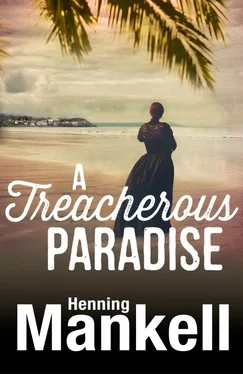They agreed on a fee, shook hands, and decided that she should start work that very same evening. Senhor Vaz couldn’t tell from the expression on Ana’s face whether or not she knew about O Paraiso, but she could hardly have failed to be aware of the fact that rua Bagamoio was the most notorious red-light street in the whole of southern Africa. Vaz had a fair idea of the wages normally paid to an experienced nurse, and had immediately doubled that amount to prevent her from hesitating for financial reasons. He also promised her accommodation in room number 2, which was the biggest one in the hotel — more of a modest suite in fact, a large corner room with a bed recess and a picture window with views over the rooftops down to the harbour and the Katembe peninsular.
And so Hanna got to know Ana Dolores. When she woke up the following morning it was no longer Felicia sitting in the basket chair by the window, nor Laurinda on her silent feet carrying in a tray with a cup of tea and nibbles. Now it was a nurse dressed in white, standing in front of her and staring at her. Without a word she took her hand and measured her pulse. Then, with no indication as to whether she was satisfied or not, she leaned over Hanna’s face, pulled her eyelid up and studied her pupils. Hanna noticed that this unknown nurse smelled of some fruit or flower she didn’t recognize. Having examined Hanna’s eyes, Ana then whipped down the thin duvet and exposed her lower abdomen. It happened so quickly that Hanna didn’t have time to hide her modesty. She raised a hand, but Ana brushed it aside, almost as if it had been an insect, and opened her patient’s legs wide. Without a word she contemplated Hanna’s pudenda, lengthily, thoughtfully. Then she folded back the duvet and left the room.
Laurinda came in with the tea tray. She was wearing a thin white cotton blouse and a colourful capulana wrapped around her hips.
Hanna raised her hand and pointed to the door, trying to reproduce an outline of the woman who had just left the room.
Laurinda understood.
‘Dona Ana Dolores,’ she said.
Hanna thought she could detect a trace of fear in Laurinda’s voice when she pronounced the nurse’s name.
But she couldn’t be sure, of course. Not about that or anything else.
Hanna was inflicted by some sort of infection that caused her a prolonged fever. She was cared for by Ana Dolores for two months. Her first feelings of being restored to health were followed by a period of extreme exhaustion which almost paralysed her. It was during this time that Ana taught Hanna how to speak Portuguese fluently. Whenever Hanna wasn’t feeling too tired, they practised speaking.
But this was also when Hanna learnt how white people ought to treat the black people who worked at the hotel — the hotel which was first and foremost a brothel for white men who happened to be visiting the port. At first Hanna thought it was uncomfortable, having to witness the unconcealed contempt, the harsh condescension that characterized everything Ana did with regard to the black women who entered the sickroom. But as time passed, despite herself Hanna began to react less to what Ana said.
When Hanna had become well enough to leave her sickbed and go for increasingly long walks through town, always accompanied by Ana, she realized that the latter’s behaviour was always the same: in the street, in the park, on one of the long beaches or in a shop — not just within the four walls of O Paraiso.
Ana Dolores took it for granted that black people were a lower order of beings. It reminded Hanna of the situation in Forsman’s house. Even though he treated his servants better than most — Berta had explained that to her — he also had nothing but contempt for those near the bottom of the social ladder. Not only inside his own house, but in society in general. When Hanna had tried to protest and used herself as an example of Forsman’s kindness, Berta had insisted that he didn’t treat everyone like that. And Hanna had also noticed occasionally that Forsman could be condescending to the poor people he came across.
Ana explained it to her:
‘The blacks are merely shadows of us. They have no colour. God made them black so that we didn’t have to see them in the dark. And we should never forget where they came from.’
Even though Hanna got used to it, she still regarded Ana’s behaviour with unease. When she hit out at black women who didn’t move out of her way, or didn’t hesitate to smack children who tried to sell her bananas in the streets, Hanna simply wanted to run away. All the time, as if it were an obvious part of the job of caring for Hanna, Ana talked about their inferiority, their deceitfulness, their filthiness in both body and soul. Hanna’s resistance decreased. She took on board what she heard, as if it were true after all. She realized that there was a crucial difference compared with the life she had lived in Forsman’s house. There she had been one of the poor workers and servants. Here, because of the colour of her skin, she was on a quite different level, superior to the blacks. Here she was the one who made the decisions, who had the right to give orders and punish black people with divine blessing. Here she was the equivalent of Jonathan Forsman. Despite the fact that she was merely a cook who had deserted her ship.
One day, towards the end of the long time Ana was looking after Hanna, they went for a walk in the little botanical gardens a few streets away from the rua Bagamoio, next to the hill where the new, shiny white cathedral was being built. Both of them were carrying open parasols to protect them from the sun. It was very hot, and they sought out the shady areas of the park where it was a bit cooler. Notices on the iron entrance gates to the park informed visitors that benches were for whites only. The text was worded so threateningly that although they had a right to be in the park, blacks preferred not to go walking along the sandy paths. The only ones in the park on this occasion were half-naked gardeners weeding the flowerbeds, constantly on the lookout for poisonous snakes that might emerge from the fallen leaves.
Many of the benches were occupied that afternoon. Relaxing in the park were civil servants from the various colonial offices, mothers with daughters playing hopscotch and sons running after their hoops.
Ana suddenly stopped dead. Sitting fast asleep on a bench in front of her was an elderly black man. Hanna could see the anger in her face even before she hit the man on the shoulder. He woke up slowly, looked enquiringly at the two women, then prepared to go back to sleep.
Once before in her life Hanna had seen an old man open his eyes in that same slow way. It was when she and Jukka had entered the room where the old man who had been a lodger in her relatives’ house was lying in his filthy bed. Just like him, this old black man barely knew where he was. He seemed hungry, thin and on the brink of dehydration. His skin was stretched tightly over his cheekbones.
Before Hanna had chance to react Ana had grabbed hold of him, lifted him up like a floppy doll and thumped him so hard that he went flying into a clump of rhododendron bushes. He remained lying there on the ground while Ana wiped the bench with a handkerchief, then beckoned Hanna to sit down.
For a brief moment everything in the park came to a stop. The hoops stopped rolling, the ladies on the benches fell silent, the half-naked gardeners with their sweaty bodies crouching down in the flowerbeds remained stock-still. Afterwards, when normality had been restored, Hanna wondered if the stillness was due to what had already happened, or to what was going to happen.
Would anything at all happen, in fact?
Hanna glanced furtively at Ana, who was holding her parasol in one hand and slowly waving the other one in front of her face. Hanna looked behind her. The old man was still lying among the blossoming bushes. He wasn’t moving at all.
Читать дальше












